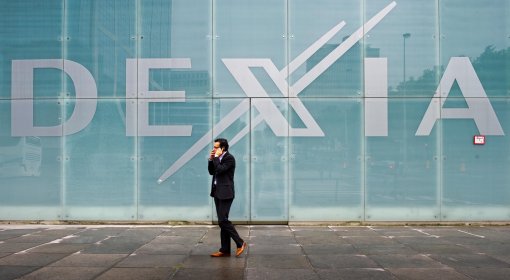Dexia Is Northern Rock
 THERE’S a Belgian/French bank out there called Dexia. No, I’d not heard of it until a couple of days ago either. The reason I have heard of it, the reason it’s in the papers, is because it seems to be going bust.
THERE’S a Belgian/French bank out there called Dexia. No, I’d not heard of it until a couple of days ago either. The reason I have heard of it, the reason it’s in the papers, is because it seems to be going bust.
At times during Tuesday’s trading session in Brussels, Dexia shares changed hands for less than €1 and at the close were quoted at €1.008, marking a 22.5pc fall for the day and close to a 60pc drop since the beginning of the year.
The collapse in Dexia’s market value, which currently stands at €1.96bn (£1.68bn), came as François Baroin, France’s finance minister, and Didier Reynders, Belgium’s finance minister, issued a statement saying they would “take all necessary measures for the security of depositors and creditors” and would “guarantee financing raised by Dexia”.
There’s two problems here, the second making the first much worse. The first is that they’ve blown most of the money, the capital of the bank that is, on buying Greek etc government bonds which are now worth 50%, 30%, of what they first paid for them. So the bank is teetering around being bust, having exhausted or nearly so all of its capital reserves.
This isn’t actually a massive problem. So, bank goes bust, shareholders lose their money, new people buy the bank (maybe even the government) and the bank itself is still there. And, crucially, so is all the money of the depositors. As a depositor you don’t have to worry, or at least not very much, if the bank goes bust because the government guarantees your deposit.
Governments do this because without such a guarantee then banks will be subject to bank runs and banks runs are self-fulfilling. People think the bank might go bust, take their money out and the bank does go bust because people have taken their money out. So, the guarantee is in place, we don’t get a bank run but if management has been stupid shareholders still lose their money, but not depositors.
Excellent: except:
while its loan to deposit ratio is in excess of 250pc.
This is what makes it like Northern Rock.
If you can’t, or don’t want to go through the bother, of getting people to deposit money with the bank that you can then lend out, go off to the wholesale money markets instead. Borrow from other banks to lend to your customers, borrow from money market funds to buy Greek bonds.
The problem with this is that such “wholesale” borrowing isn’t covered by the government guarantees. So, if the markets get a whiff that you might be going bust, then they’ll pull their deposits out (you borrowing money is them making a deposit with you: banking terms can be a tad confusing at times) and you go bust.
This is exactly what happened to Northern Rock. Those lines of people drawing our their savings, they were the end of the process, not the beginning. It was those wholesale markets taking their money out before that that doomed Northern Rock. Because, as with Dexia, they had a very large part of their funding coming from those unguaranteed wholesale markets, rather than the guaranteed depoists of individuals.
Different country, different banking system, different type of ownership (Dexia is partly government owned) but same problem. Dexia is, in this sense, Northern Rock.
Posted: 5th, October 2011 | In: Money Comment | TrackBack | Permalink


